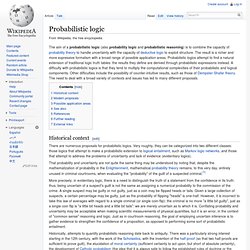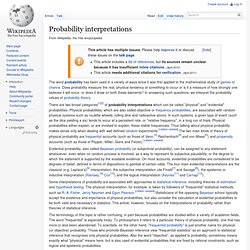

Probabilistic logic. The aim of a probabilistic logic (also probability logic and probabilistic reasoning) is to combine the capacity of probability theory to handle uncertainty with the capacity of deductive logic to exploit structure.

The result is a richer and more expressive formalism with a broad range of possible application areas. Probabilistic logics attempt to find a natural extension of traditional logic truth tables: the results they define are derived through probabilistic expressions instead. Probability interpretations. The word probability has been used in a variety of ways since it was first applied to the mathematical study of games of chance.

Does probability measure the real, physical tendency of something to occur or is it a measure of how strongly one believes it will occur, or does it draw on both these elements? In answering such questions, we interpret the probability values of probability theory. There are two broad categories[1][2] of probability interpretations which can be called "physical" and "evidential" probabilities. Physical probabilities, which are also called objective or frequency probabilities, are associated with random physical systems such as roulette wheels, rolling dice and radioactive atoms.